Arts & Entertainment
No LGBTQ role or film winners at 75th Golden Globes, despite multiple nominations
But thanks to Oprah, #metoo movement soars
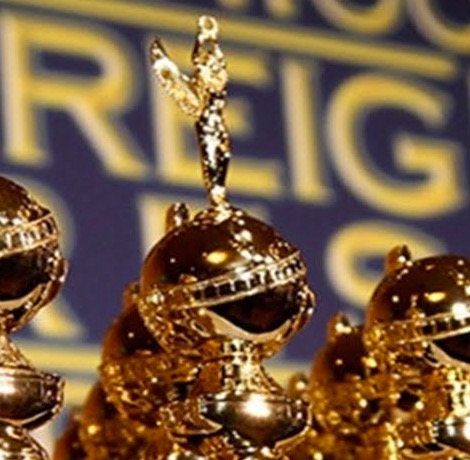

Start of the 75th Golden Globes live from the Beverly Hilton Jan. 7, 2018.
The 75th anniversary Golden Globes featured Hollywood actors donning all-black gowns and suits, and wearing #TimesUp pins in support in of those who have spoken out about sexual harassment and to protest gender inequality. It was a hugely important night celebrating women and women’s stories.
But many in the LGBTQ community were left puzzled by the lack of representation among the acting, directing and screenwriting category nominees and winners, even though #TimesUp resonates against homophobia too.
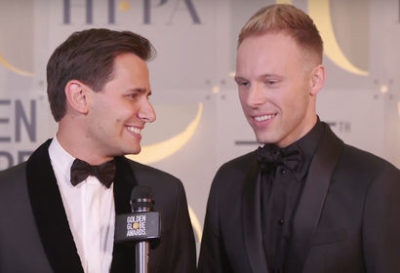
Gay men Benji Pasek, Justin Paul won for Best Original Song, with “This Is Me” in “The Greatest Showman. (Photo courtesy Golden Globe Winners Stage)
While “Handmaid’s Tale” and “Lady Bird” (both LGBTQ-themed projects) picked up awards, and there was a big win for Benji Pasek for Best Original Song, with “This Is Me” in “The Greatest Showman,” the night was entirely bereft of awards for LGBT roles, themed films or out actors.
D.C.-based film critic and the founder of Cinema Siren, Leslie Combemale says the omission of out lesbian, gay and trans actors among the nominations is not unlike the traditional silencing of women in the industry that led to the current crisis.
“It’s just a group of underrepresented people in the entertainment world that Hollywood doesn’t believe is capable of performing on that level… which is crazy,” Combemale told the Los Angeles Blade.
“Look at the film, ‘Fantastic Woman,’” she says. “Here’s an example of a great transgender actor [Daniela Vega] with an amazing performance who wasn’t even nominated.”
Combemale went on to step to tread delicate waters, pointing out that many in Hollywood have remained closeted and that they are at fault here.
“Until more gay roles become available to openly gay actors, then that’s going to continue to be part of the problem — people not feeling confident about being their true selves in that environment,” she says.
John Paul King, Los Angeles Blade film critic says, “There were a lot of excellent and diverse films nominated this year, and of course all the winners deserved to take home their prizes. And I think the fact that both Best Picture winners were very muchdriven by a female perspective – even though “Three Billboards” was written and directed by a man – was very telling.”
Beyond LGBT issues, it was not an entirely challenged event on the diversity front, however.
In a historic moment, actor Sterling K. Brown, star of the TV series “This is Us,” won for Best Lead Actor in a TV Drama. He was the first Black actor to win in this category. Last year, he won Best Supporting Actor in a TV Drama for his role in “The People v. O. J. Simpson: American Crime Story.”
But it was Oprah Winfrey’s speech that was the highlight of the evening. The media mogul, actress, and producer, was honored with the Cecil B. DeMille award. She is the first black woman to win.
Doing what she does best — inspiring and empowering — Winfrey talked about her own inspiration remembering when Sydney Poitier become the first Black man to win an Oscar in 1964 for “Lilies of the Field.” And what it meant to her as a little girl.
“Up on the stage came the most elegant man I had ever seen,” she recalled. “I had never seen a black man recognized like that before. What a moment like that means to a little girl, a kid watching from the cheap seats, as my mom came through the door, bone-tired from cleaning other people’s houses,” Oprah said in her acceptance speech.
“There are some little girls watching as I become the first black woman to be given this award,” she went on.
Winfrey recalled the story of Recy Taylor, a black woman whose 1944 rape by six white men did not lead to any convictions. Taylor passed away last month at the age of 97.
“She lived — as we all have lived — in a culture broken by brutally powerful men,” Winfrey said. “For too long, women have not been heard or believed if they dared to speak their truth to the power of those men, but their time is up.”
But Oprah brought Hollywood to its feet when she talked about the future of women in a world without discrimination and harassment. She gave a full-throated clarion call for change that could resonate beyond Hollywood.
“I want all of the girls watching here now to know, that a new day is on the horizon. And when that new day finally dawns, it will be because of a lot of magnificent women, many of whom are right here in this room tonight, and some pretty phenomenal men, fighting hard to make sure that they become the leaders who take us to the time when nobody ever has to say, ‘me too’ again.”
There were several straight actors nominated for playing gay roles, but none took home the gold.
Armie Hammer, Actor in a Supporting Role, for “Call Me by Your Name,” [Sam Rockwell won for “Three Billboards Outside Ebbing, Missouri”] and Timothée Chalamet, Actor in a Motion Picture, Drama, also for “Call Me by Your Name” [Gary Oldman, won for “Darkest Hour”]. Emma Stone, Actress in a Motion Picture, Comedy, for her role as Billie Jean King in “Battle of the Sexes,” [Saoirse Ronan, won for “Lady Bird”]. In television, Eric McCormack nabbed a nomination for his role as Will in NBC’s revived “Will & Grace,” [Aziz Ansari “Master of None”].
“When someone who’s gay comes out as gay, everyone’s like ‘oh my God, I can’t believe it.’ But, when a straight actor plays gay, everyone says, ‘oh, he or she is so brave.’ That’s ridiculous. It does piss me off. Just like when a Jewish character is played by a Greek,” standup comedian, actress, Emmy award winning television writer, and producer Judy Gold told the Los Angeles Blade.
Combemale says the Globes missed the boat on a quiet a few films with LGBTQ actors and creative.
She says “Mudbound,” Dee Reese, the director and half of the screenwriting team, who is Black and a lesbian. “She’s a star. Eventually it will happen. It’s a great movie and that’s a big miss,” Combemale says.
Also, she cites writer-Director Angela Robinson for “Professor Marston and the Wonder Women” who seemed to disappear from the radar.
“And ‘BPM (beats per minute)’ a French film was a huge miss. Internationally, it might be that gay and lesbian actors are playing gay characters and not in the U.S.,” she says.
Combemale says she believes there were several options for lesbian actresses who could have played the Billie Jean Smith role in “Battle of the Sexes,” outside of Emma Smith. “I don’t believe the movie wouldn’t have gotten films without her.”
Although “Call Me by Your Name” was nominated for Best Motion Picture Drama, it has a gay director, Luca Guadagnino, and screenwriter James Ivory, neither of whom were nominated. Many were rooting for the film as it has several queer producers, including Guadagnino and Ivory, who would take home gold if the film won. “Three Billboards Outside Ebbing, Missouri” won the award.
“It’s important for the LGBTQ community to continue to speak up, especially in the current cultural and political climate, about being included. That doesn’t mean we’re less than one-hundred percent supportive of the women’s movement, but we must make sure our voices are heard, too,” says Los Angeles Blade’s King. “Movies are a big part of how people’s attitudes change, and when Hollywood send the message that we matter, too, it’s a huge step forward in our struggle to be recognized as equal’”
We can only hope that the new culture Oprah says has been ushered in will be one in which gay and lesbian actors can be considered for gay or lesbian roles and where there is no penalty for being out.
Times up for all that, too.
For the complete list of winners go here.

More than a dozen LGBTQ athletes won medals at the Milan Cortina Winter Olympics that ended on Sunday.
Cayla Barnes, Hilary Knight, and Alex Carpenter are LGBTQ members of the U.S. women’s hockey team that won a gold medal after they defeated Canada in overtime. Knight the day before the Feb. 19 match proposed to her girlfriend, Brittany Bowe, an Olympic speed skater.
French ice dancer Guillaume Cizeron, who is gay, and his partner Laurence Fournier Beaudry won gold. American alpine skier Breezy Johnson, who is bisexual, won gold in the women’s downhill. Amber Glenn, who identifies as bisexual and pansexual, was part of the American figure skating team that won gold in the team event.
Swiss freestyle skier Mathilde Gremaud, who is in a relationship with Vali Höll, an Austrian mountain biker, won gold in women’s freeski slopestyle.
Bruce Mouat, who is the captain of the British curling team that won a silver medal, is gay. Six members of the Canadian women’s hockey team — Emily Clark, Erin Ambrose, Emerance Maschmeyer, Brianne Jenner, Laura Stacey, and Marie-Philip Poulin — that won silver are LGBTQ.
Swedish freestyle skier Sandra Naeslund, who is a lesbian, won a bronze medal in ski cross.
Belgian speed skater Tineke den Dulk, who is bisexual, was part of her country’s mixed 2000-meter relay that won bronze. Canadian ice dancer Paul Poirier, who is gay, and his partner, Piper Gilles, won bronze.
Laura Zimmermann, who is queer, is a member of the Swiss women’s hockey team that won bronze when they defeated Sweden.
Outsports.com notes all of the LGBTQ Olympians who competed at the games and who medaled.
Theater
José Zayas brings ‘The House of Bernarda Alba’ to GALA Hispanic Theatre
Gay Spanish playwright Federico García Lorca wrote masterpiece before 1936 execution

‘The House of Bernarda Alba’
Through March 1
GALA Hispanic Theatre
3333 14th St., N.W.
$27-$52
Galatheatre.org
In Federico García Lorca’s “The House of Bernarda Alba,” now at GALA Hispanic Theatre in Columbia Heights, an impossibly oppressive domestic situation serves, in short, as an allegory for the repressive, patriarchal, and fascist atmosphere of 1930s Spain
The gay playwright completed his final and arguably best work in 1936, just months before he was executed by a right-wing firing squad. “Bernarda Alba” is set in the same year, sometime during a hot summer in rural Andalusia, the heart of “España profunda” (the deep Spain), where traditions are deeply rooted and mores seldom challenged.
At Bernarda’s house, the atmosphere, already stifling, is about to get worse.
On the day of her second husband’s funeral, Bernarda Alba (superbly played by Luz Nicolás), a sixtyish woman accustomed to calling the shots, gathers her five unmarried daughters (ages ranging from 20 to 39) and matter-of-factly explain what’s to happen next.
She says, “Through the eight years of mourning not a breeze shall enter this house. Consider the doors and windows as sealed with bricks. That’s how it was in my father’s house and my grandfather’s. Meanwhile, you can embroider your trousseaux.”
It’s not an altogether sunny plan. While Angustias (María del Mar Rodríguez), Bernarda’s daughter from her first marriage and heiress to a fortune, is betrothed to a much younger catch, Pepe el Romano, who never appears on stage, the remaining four stand little chance of finding suitable matches. Not only are they dowry-less, but no men, eligible or otherwise, are admitted into their mother’s house.
Lorca is a literary hero known for his mastery of both lyrical poetry and visceral drama; still, “Bernarda Alba’s” plotline might suit a telenovela. Despotic mother heads a house of adult daughters. Said daughters are churning with passions and jealousies. When sneaky Martirio (Giselle Gonzáles) steals the photo of Angustias’s fiancé all heck kicks off. Lots of infighting and high drama ensue. There’s even a batty grandmother (Alicia Kaplan) in the wings for bleak comic relief.
At GALA, the modern classic is lovingly staged by José Zayas. The New York-based out director has assembled a committed cast and creative team who’ve manifested an extraordinarily timely 90-minute production performed in Spanish with English subtitles easily ready seen on multiple screens.
In Lorca’s stage directions, he describes the set as an inner room in Bernarda’s house; it’s bright white with thick walls. At GALA, scenic designer Grisele Gonzáles continues the one-color theme with bright red walls and floor and closed doors. There are no props.
In the airless room, women sit on straight back chairs sewing. They think of men, still. Two are fixated on their oldest siter’s hunky betrothed. Only Magdelena (Anna Malavé), the one sister who truly mourns their dead father, has given up on marriage entirely.
The severity of the place is alleviated by men’s distant voices, Koki Lortkipanidze’s original music, movement (stir crazy sisters scratching walls), and even a precisely executed beatdown choreographed by Lorraine Ressegger-Slone.
In a short yet telling scene, Bernarda’s youngest daughter Adela (María Coral) proves she will serve as the rebellion to Bernarda’s dictatorship. Reluctant to mourn, Adela admires her reflection. She has traded her black togs for a seafoam green party dress. It’s a dreamily lit moment (compliments of lighting designer Hailey Laroe.)
But there’s no mistaking who’s in charge. Dressed in unflattering widow weeds, her face locked in a disapproving sneer, Bernarda rules with an iron fist; and despite ramrod posture, she uses a cane (though mostly as a weapon during one of her frequent rages.)
Bernarda’s countenance softens only when sharing a bit of gossip with Poncia, her longtime servant convincingly played by Evelyn Rosario Vega.
Nicolás has appeared in “Bernarda Alba” before, first as daughter Martirio in Madrid, and recently as the mother in an English language production at Carnegie Melon University in Pittsburgh. And now in D.C. where her Bernarda is dictatorial, prone to violence, and scarily pro-patriarchy.
Words and phrases echo throughout Lorca’s play, all likely to signal a tightening oppression: “mourning,” “my house,” “honor,” and finally “silence.”
As a queer artist sympathetic to left wing causes, Lorca knew of what he wrote. He understood the provinces, the dangers of tyranny, and the dimming of democracy. Early in Spain’s Civil War, Lorca was dragged to the the woods and murdered by Franco’s thugs. Presumably buried in a mass grave, his remains have never been found.
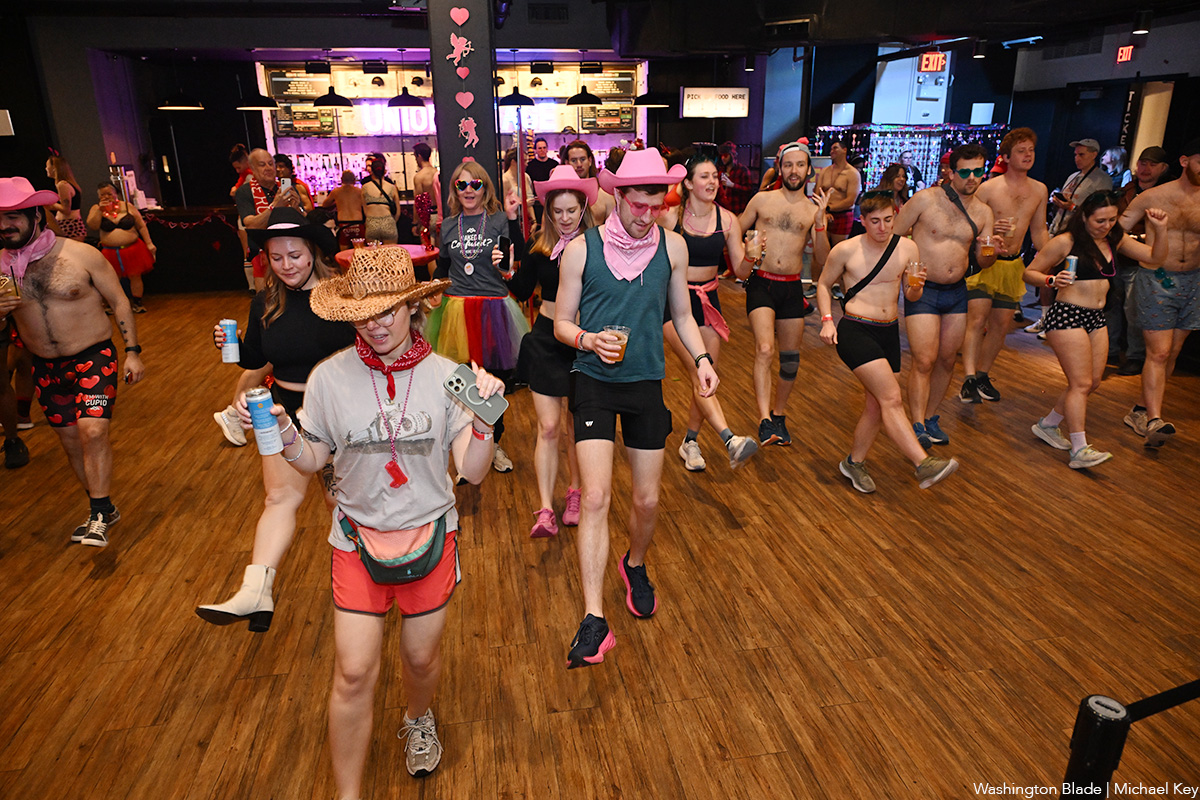
Cupid’s Undie Run, an annual fundraiser for neurofibromatosis (NF) research, was held at Union Stage and at The Wharf DC on Saturday, Feb. 21.
(Washington Blade photos by Michael Key)
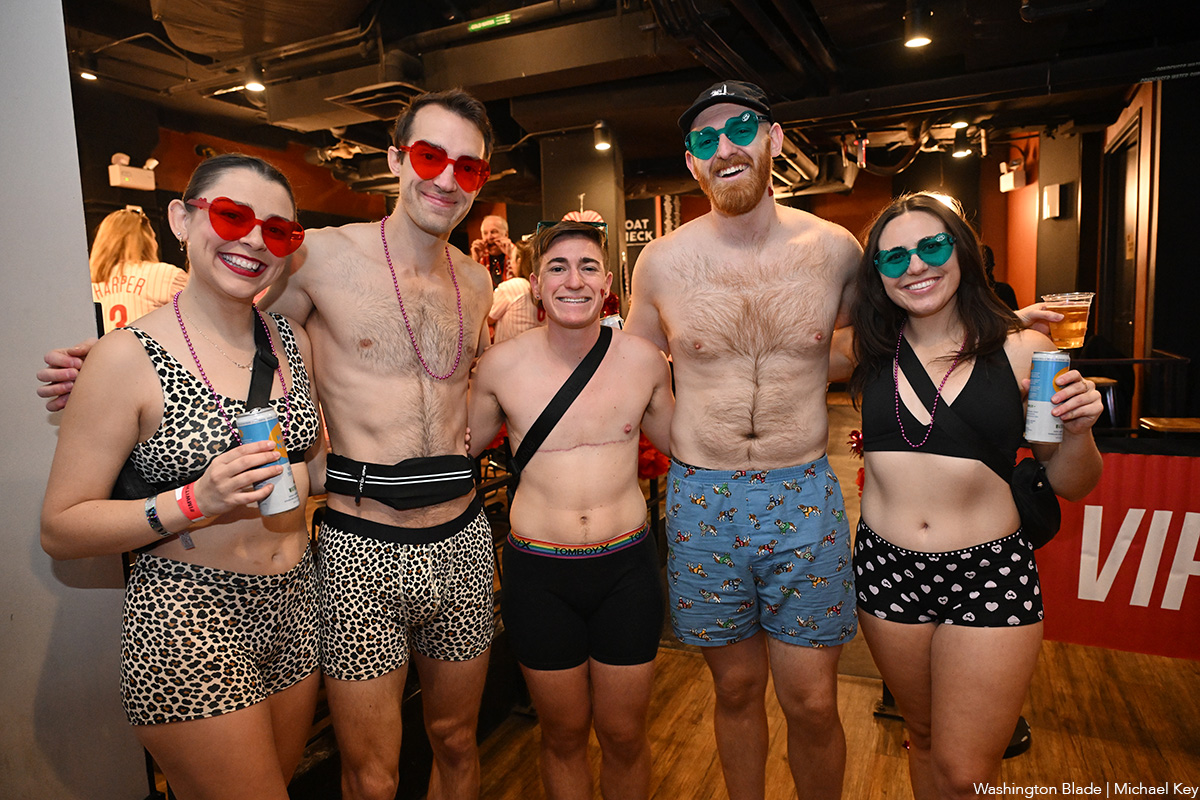
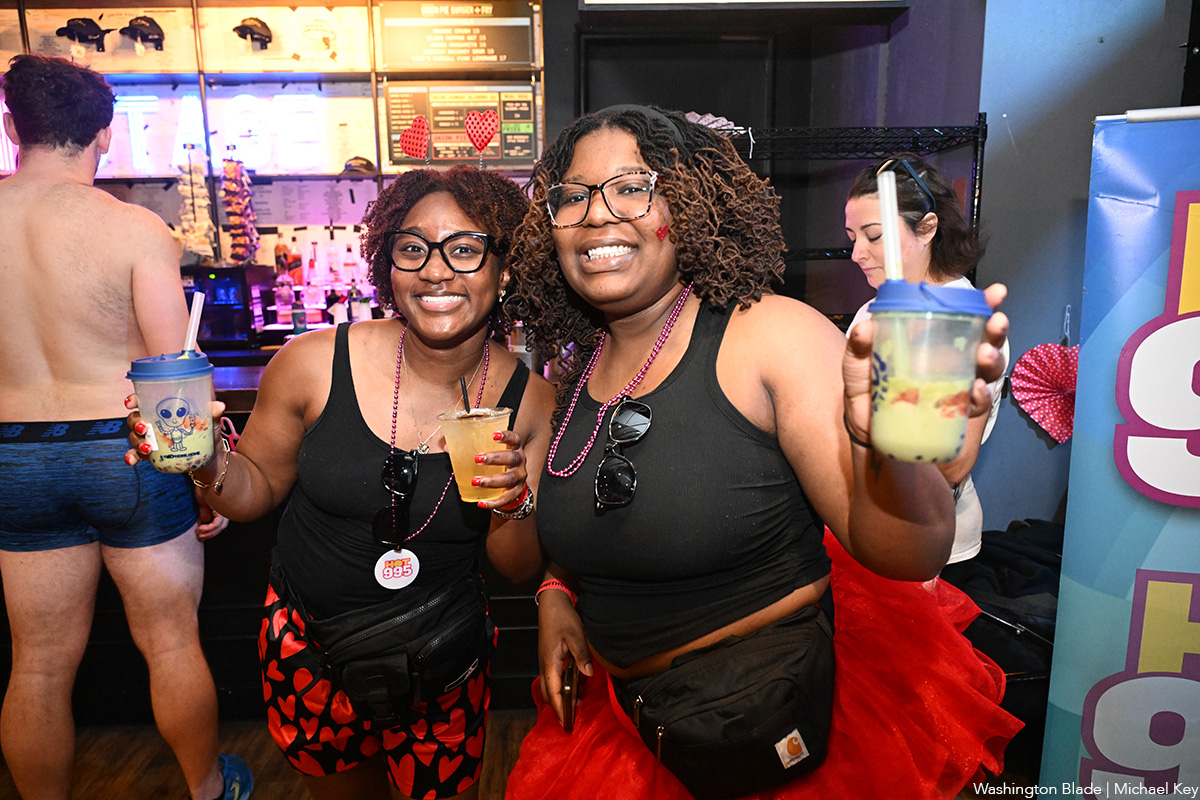
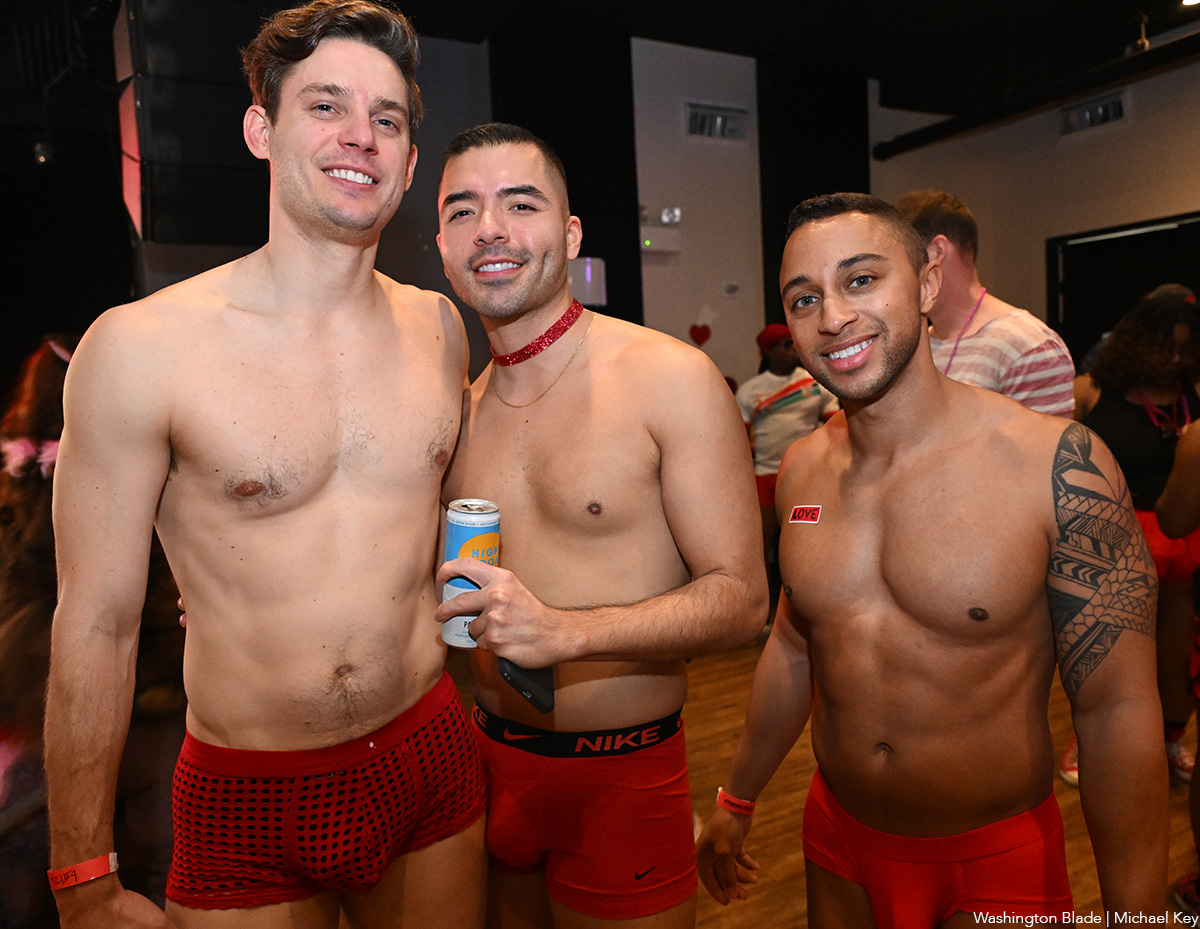
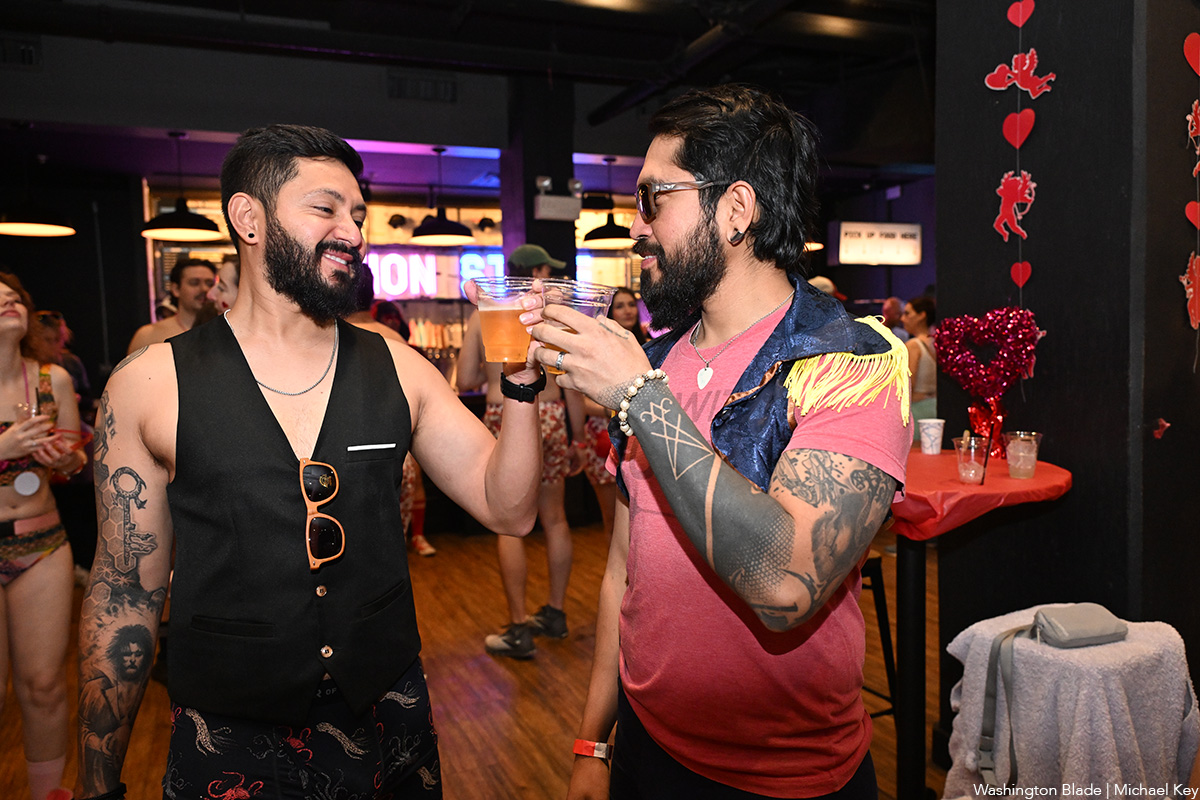

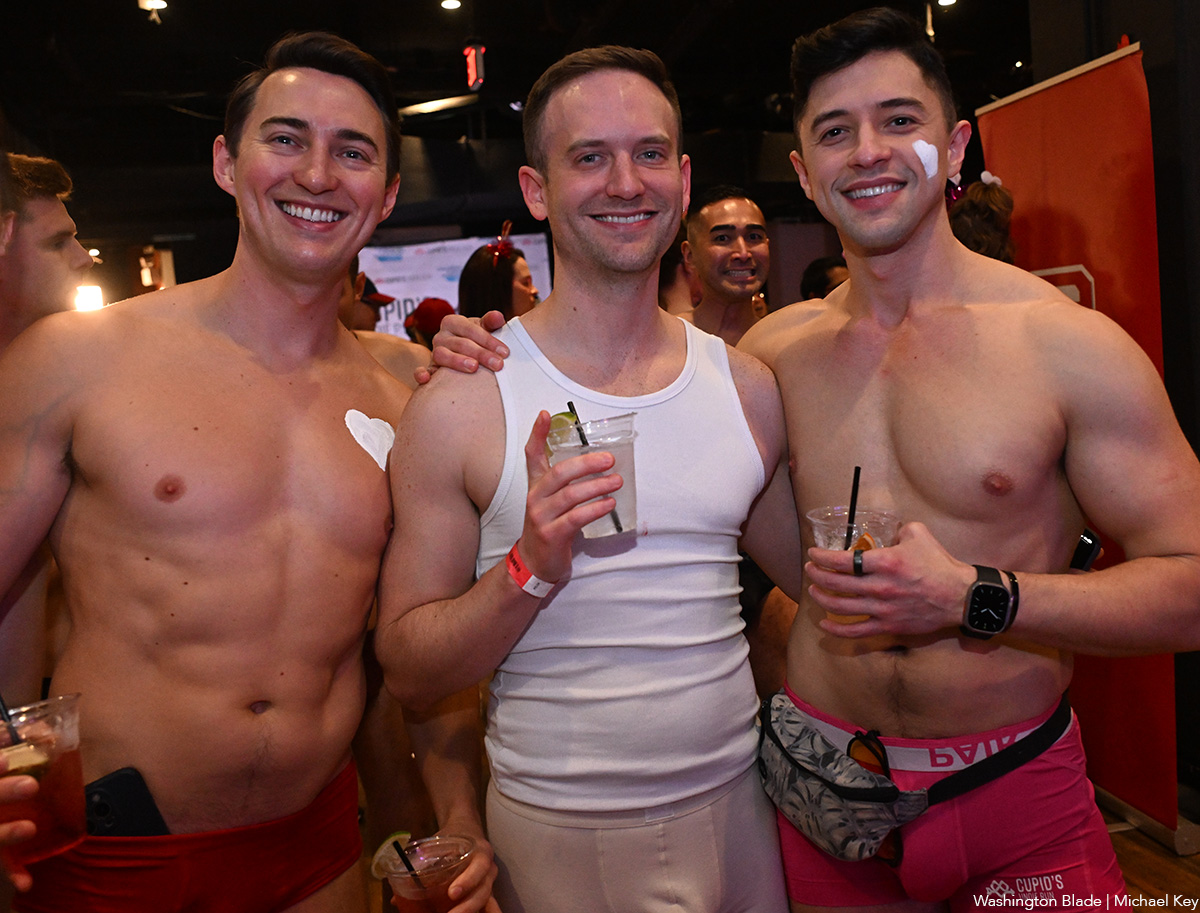

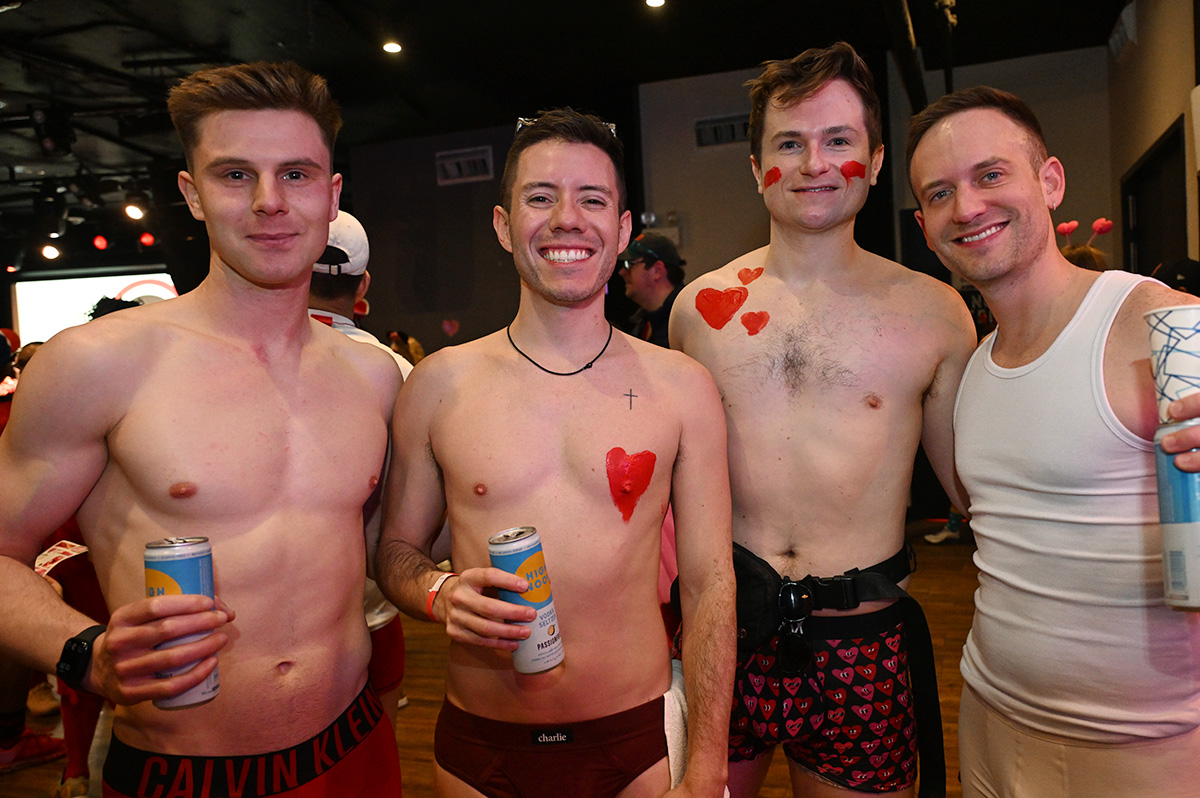
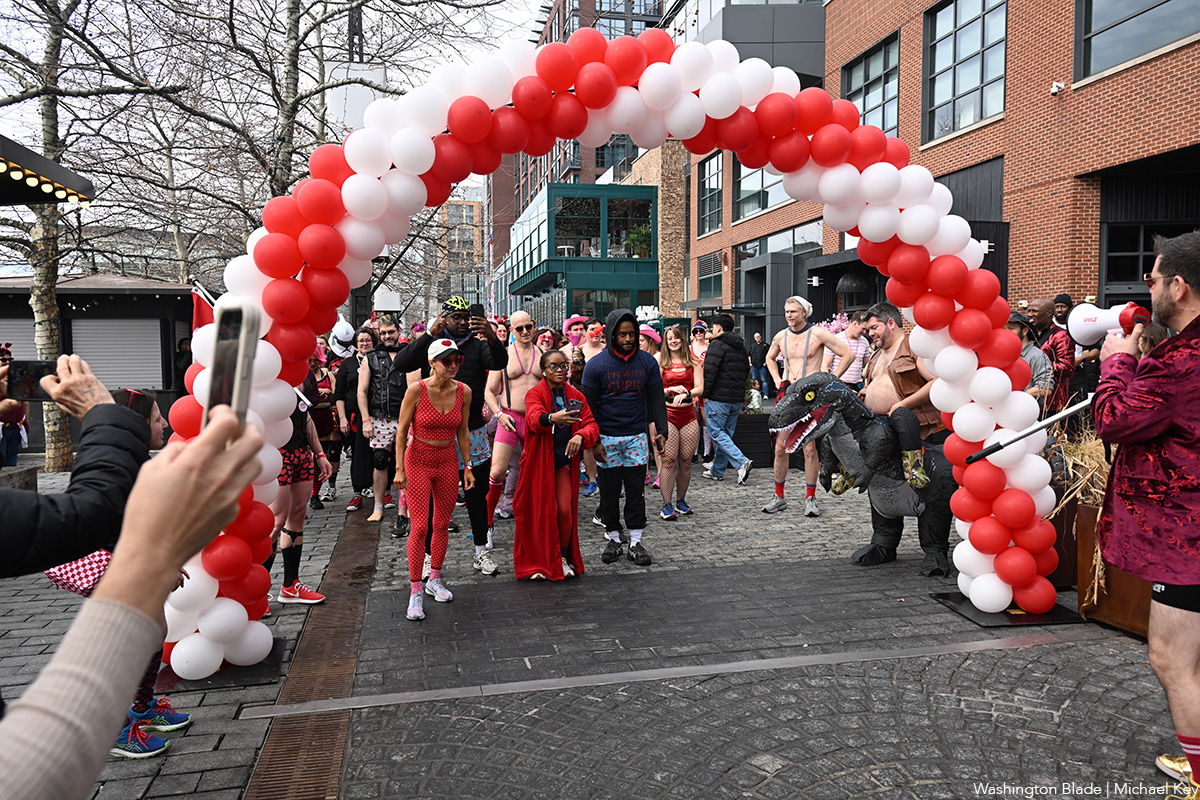
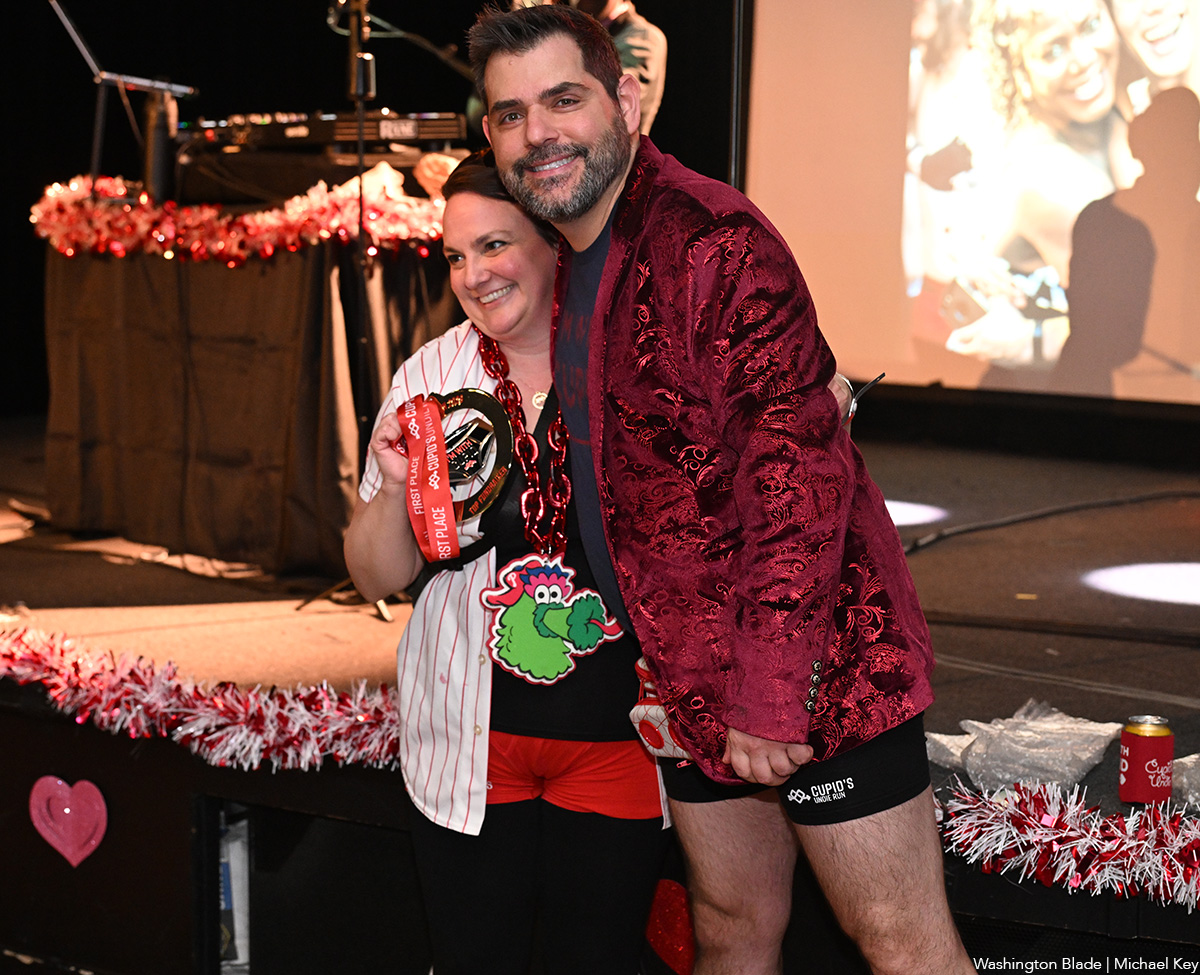
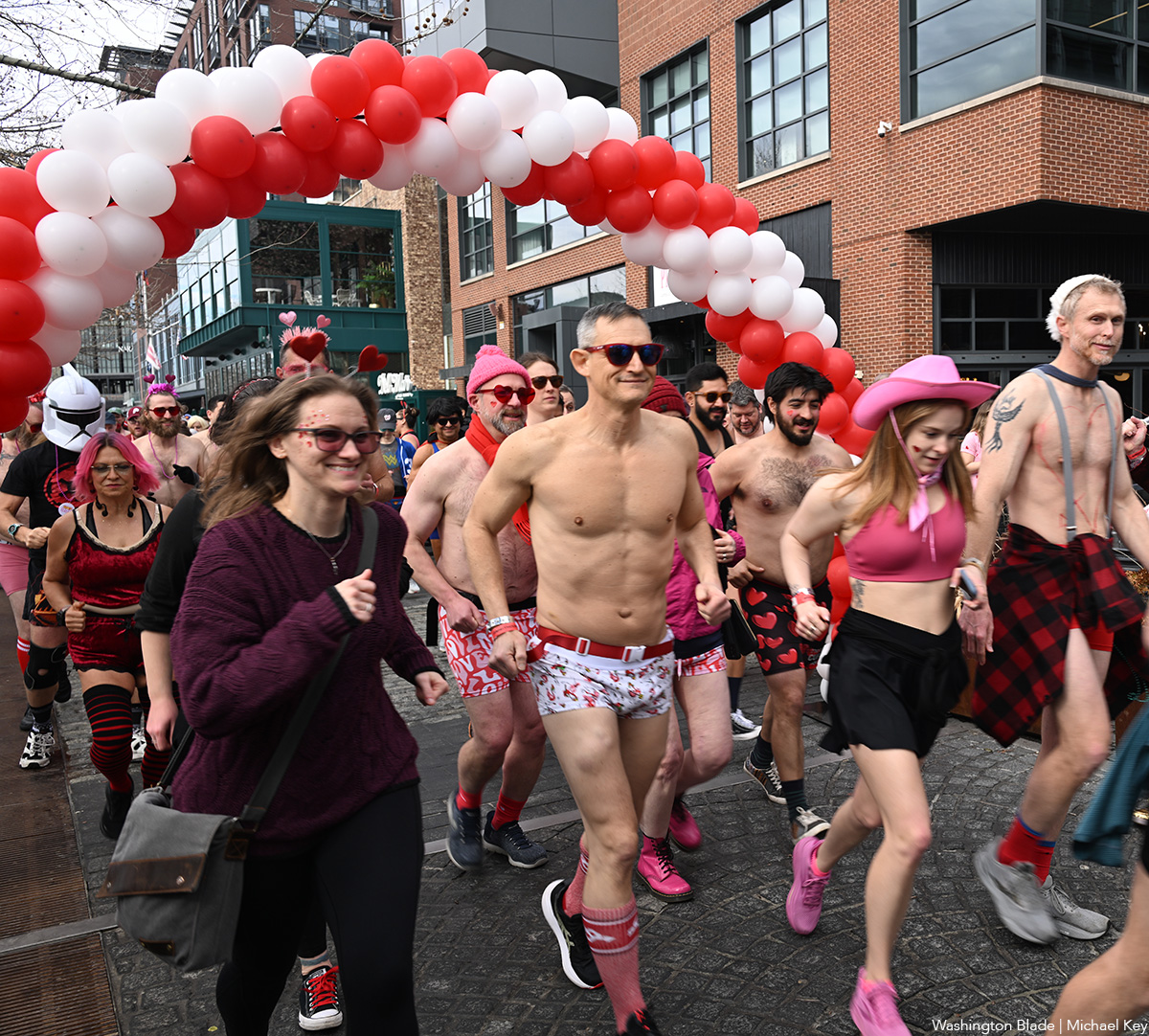

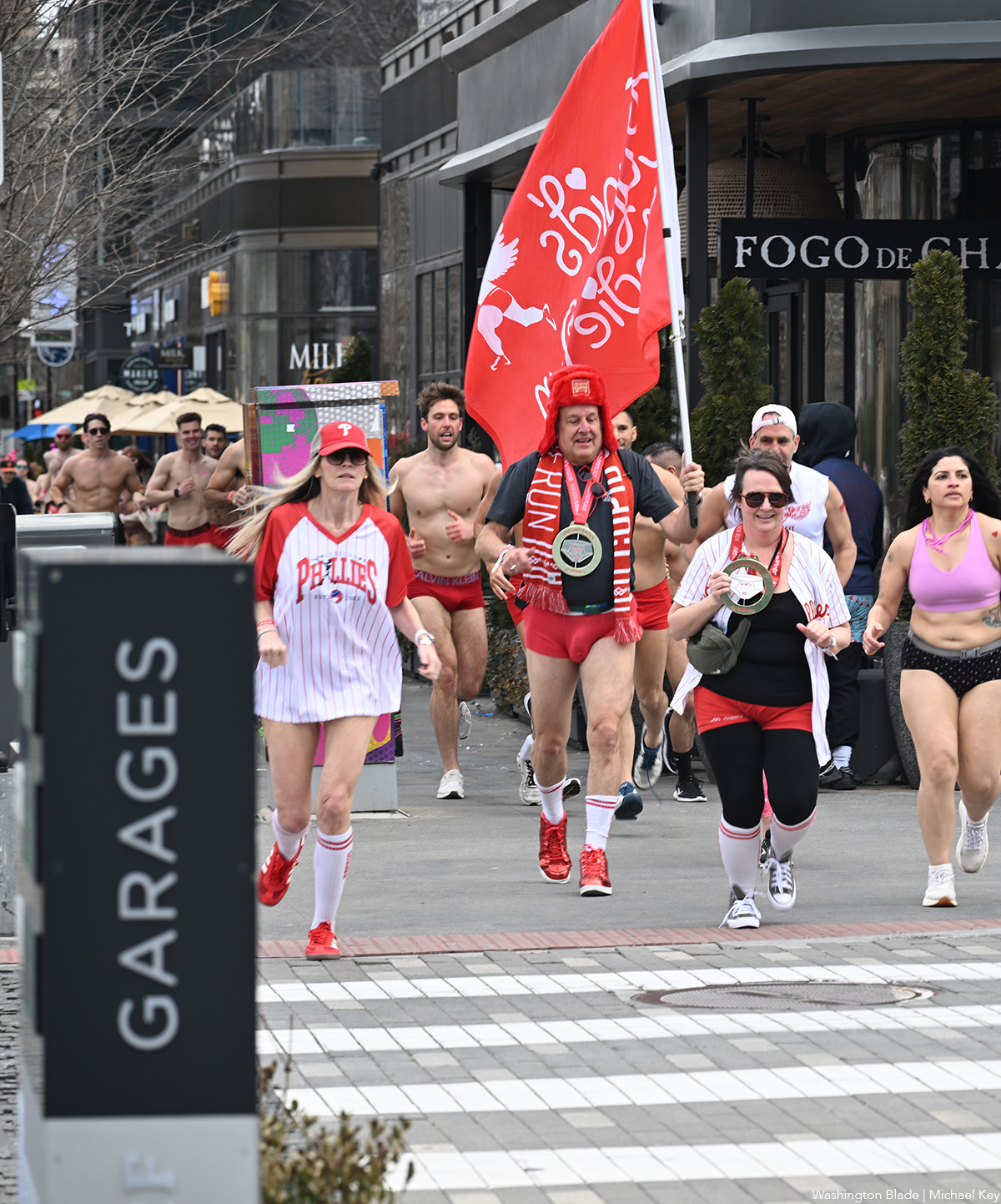
-

 Movies5 days ago
Movies5 days agoRadical reframing highlights the ‘Wuthering’ highs and lows of a classic
-

 District of Columbia3 days ago
District of Columbia3 days agoJudge rescinds order against activist in Capital Pride lawsuit
-

 Ecuador4 days ago
Ecuador4 days agoJusticia reconoce delito de odio en caso de bullying en Instituto Nacional Mejía de Ecuador
-

 District of Columbia4 days ago
District of Columbia4 days agoTrans activists arrested outside HHS headquarters in D.C.



















